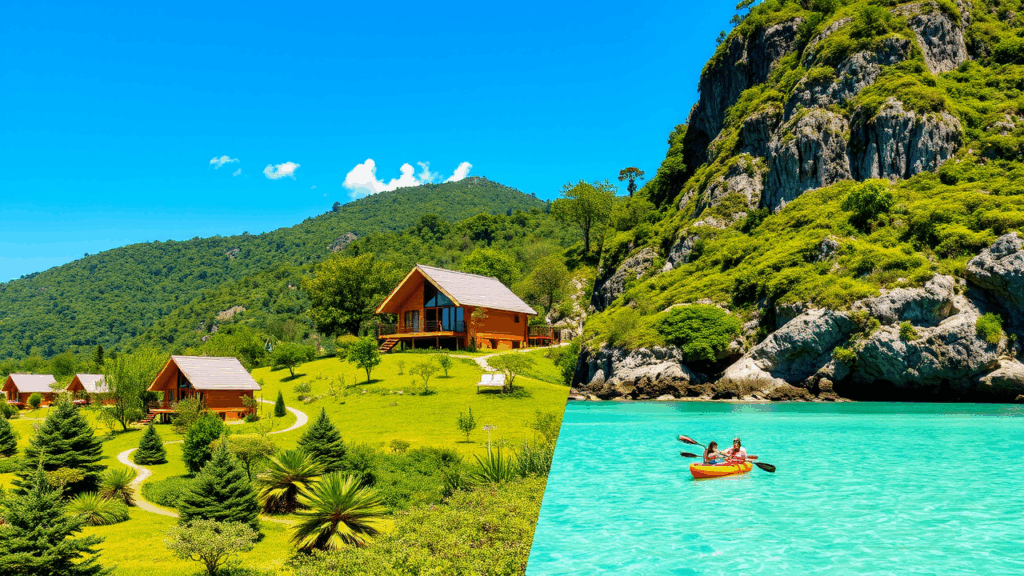# The Future of Travel: Navigating Sustainability and Innovation
Travel has long been a pillar of human connection, exploration, and cultural exchange. However, with the pressing challenges of climate change, environmental degradation, and over-tourism, the travel industry stands at a critical crossroads. Is the industry moving toward a more sustainable future, or are we headed for a crisis? This comprehensive exploration breaks down the current state of travel, what changes are on the horizon, and how travelers and industry leaders can shape a more sustainable, innovative future.
## Part One: An Unsustainable Industry
The traditional travel industry has thrived on growth—luxury resorts, mass tourism, and widespread air travel. However, this growth often comes at a significant environmental cost. Increased carbon emissions from flights, overburdened natural sights, and cultural erosion threaten the very destinations we cherish. The COVID-19 pandemic shone a spotlight on these issues, revealing how vulnerable our travel systems are to disruptions and underscoring the need for sustainability.
Air travel alone contributes nearly 2.4% of global carbon dioxide emissions, and this is expected to rise as travel demand continues to rebound. Over-tourism damages ecosystems and diminishes local communities’ quality of life. Without radical change, the industry’s environmental footprint will grow, exacerbating climate change and biodiversity loss.
But acknowledging the problem is only the first step. Industry stakeholders are becoming increasingly aware that sustainability isn’t optional anymore—it’s essential for survival and long-term success. The challenge lies in transforming this unsustainable system into one that preserves the planet and supports the people and cultures that travel touches.
## Part Two: The Travel Tipping Point
Surprisingly, innovation and new perspectives are already shaping the future landscape of travel. Several emerging ideas aim to radically reduce the environmental impact of travel while maintaining the joy of discovery.
### Carbon Passports
Imagine a “carbon passport” that travelers carry, which records their environmental footprint from trips and encourages responsible choices. These digital passports could track not only emissions but also offer offsets or incentives for sustainable behaviors, empowering travelers to make eco-conscious decisions. Governments and airlines are exploring such systems to promote accountability and reduce overall carbon footprints.
### Chasing the Shade
Ever felt overheated or exhausted on a trip? The concept of “chasing the shade” encourages travelers to seek cooler, more sustainable destinations—especially those that are less crowded and beleaguered by overtourism. It promotes exploring lesser-known locales, which distributes tourism’s benefits more evenly and protects overburdened popular sites.
### Virtual Vacations
For those seeking a taste of travel without leaving their homes, virtual vacations are emerging as a viable, eco-friendly alternative. Advanced VR technology can simulate immersive experiences—walking through ancient cities, exploring remote wilderness, or visiting world-famous landmarks—without the carbon footprint of travel. While not a replacement for physical trips, virtual vacations can complement traditional travel and reduce overall demand.
## Part Three: Raising a Generation of Travel Transformers
The next wave of travelers will be fundamentally different—more conscious, environmentally aware, and committed to making a positive impact. Education and exposure to sustainability issues can empower young travelers to become “travel transformers”—those who advocate for responsible tourism practices.
Education programs, sustainable travel certifications, and community-driven tourism initiatives are shaping this new mindset. Schools and travel organizations are increasingly incorporating lessons about ecological preservation and cultural sensitivity. Additionally, travel companies are adopting ethical practices—supporting local economies, conserving sites, and minimizing environmental harm—knowing that younger generations value transparency and authenticity.
Generation Z and Millennials are already pushing the industry toward more sustainable standards. Their demand for eco-lodges, ethical wildlife encounters, and carbon-neutral trips signals a shift that could redefine the industry’s trajectory.
## Part Four: Future Travel Trends Through 2040
Looking ahead to 2040, several innovative trends promise to reshape travel in profound ways:
### People-positive Travel
Travel that prioritizes social and environmental benefits—supporting local communities, conserving nature, and fostering cultural exchange—will become the norm. Projects like community-based tourism focus on empowering local residents and providing authentic experiences that also benefit the local economy.
### Ephemeral Escapes
Short-term, memorable experiences—like pop-up art installations or fleeting wilderness stays—will rise in popularity. These “ephemeral escapes” emphasize quality over quantity, encouraging travelers to savor moments rather than accumulate experiences solely for social media.
### Enhanced Eco-mobility
The transition from fossil-fuel-powered transportation to electric, hydrogen, or innovative transit options will revolutionize how we move. Hyperloop systems, electric aircraft, and autonomous vehicles could dramatically cut emissions and ease congestion, making travel faster, cleaner, and more accessible.
### Real-time Footprints
Imagine tracking your carbon and ecological impact in real-time during your trip. Apps and wearable tech could provide instant feedback, nudging travelers toward greener choices—be it opting for a solar-powered hotel, choosing eco-friendly transportation, or supporting conservation efforts. This transparency would foster accountability and inspire ongoing improvement.
## Conclusion: A Path Forward
The future of travel holds incredible promise—if we embrace innovation, responsibility, and a shared commitment to sustainability. From personal choices like virtual vacations and eco-friendly transportation, to industry-wide shifts toward ethical tourism, every stakeholder plays a vital role.
By raising awareness, fostering education, and leveraging emerging technologies, we can transform travel from an un sustainable activity into a powerful force for positive change. As travelers, cultural ambassadors, and industry leaders, we can all contribute to a future where exploration and preservation go hand in hand.
Let’s envision and work toward a travel ecosystem that enriches lives without harming our planet. Together, we can ensure that future generations will also have the chance to discover, learn, and marvel at the world’s treasures—sustainably and responsibly.
—
**Author:** Sakura El-Amin
**Category:** Travel & Environment


